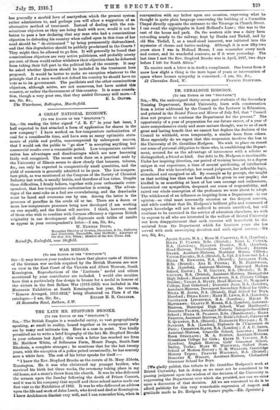THE LATE MR. STOPFORD BROOKE.
[To TEE EDITOR Or THE " SPECTATOR:' SIR,—The British Empire is a wonderful entity, so vast geographically speaking, ea small in reality, bound together as its component parts are by many and intimate ties. Here is a case in point. You kindly permitted me to write a brief biography of the late Mr. Stopford Brooks in your columns last April ; this week a letter has reached me from Mr. Matthew White, of Selbourne Farm, Mount Pangs, South-East Rhodesia, a complete stranger ; he mentions that for the last twenty years, with the exception of a police patrol occasionally, he has scarcely seen a white face. The rest of his letter speaks for itself :- " I knew the Rev. Stopford Brooke as the curate of St. Mary Abbots, Kensington. He it was who christened my younger brother, who survived his birth but three weeks, the ceremony taking place in my old home, not a stone's throw from the church. It was he who delivered the sermon upon the Sunday following the death of Prince Consort, and it was in his company that myself and three school mates made our first visit to the Exhibition of 1862. It was ho who delivered an address upon the life and work of John Leech, who lived and died at Kensington. I knew Archdeacon Sinclair very well, and I can remember him, when in
conversation with my father upon one occasion, expressing what he though in quite plain language concerning the building of a Carmelite Chapel directly opposite the entrance to the Vicarage in Church Street. I can recall the nightingales in Lord Holland's Lane ; this was to the east of the house and park. On the western side was a dairy farm extending nearly to the railway, kept by Dunks and Tisdall, and by old Mrs. Tisdall, I, as a small-sized innocent, was initiated into the mysteries of cheese-and butter-making. Although it is now fifty-two years since I was in Holland House, I can remember every nook and corner, and Its wonderful contents, as if it were yesterday. The last time I met the Rev. Stopford Brooke was in April, 1387, two days before I left for South Africa."
To receive suoh a letter is in itself a compliment. One learns from it anew how slight a thing is the mere lapse of years or intervention of space where human sympathy is concerned.—I am, Sir, &o.,






























 Previous page
Previous page